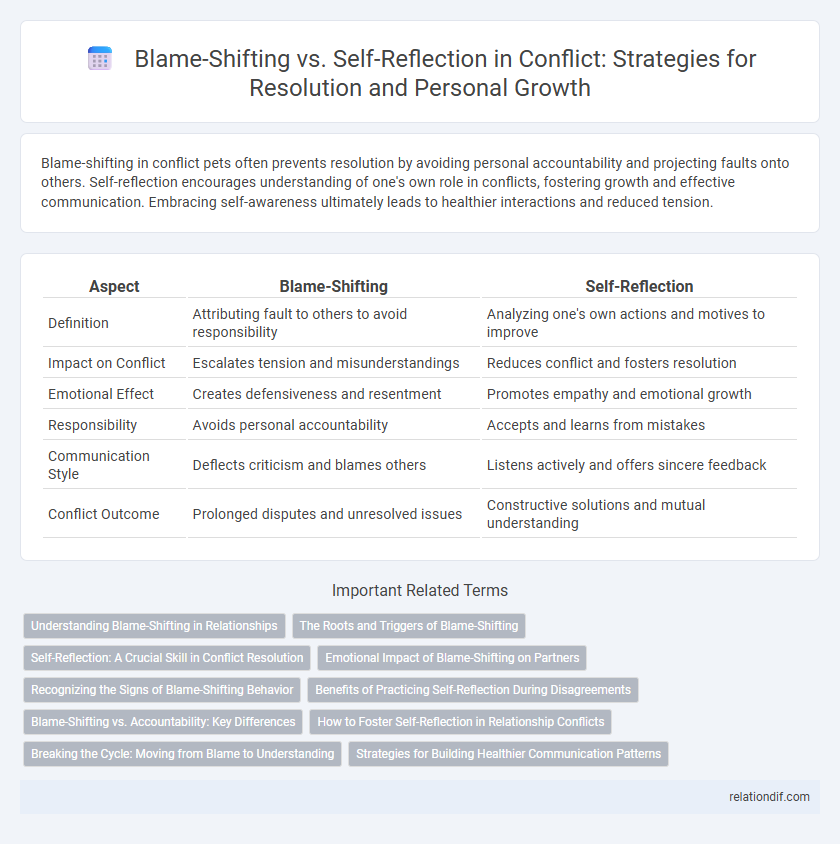Blame-shifting in conflict pets often prevents resolution by avoiding personal accountability and projecting faults onto others. Self-reflection encourages understanding of one's own role in conflicts, fostering growth and effective communication. Embracing self-awareness ultimately leads to healthier interactions and reduced tension.
Table of Comparison
| Aspect | Blame-Shifting | Self-Reflection |
|---|---|---|
| Definition | Attributing fault to others to avoid responsibility | Analyzing one's own actions and motives to improve |
| Impact on Conflict | Escalates tension and misunderstandings | Reduces conflict and fosters resolution |
| Emotional Effect | Creates defensiveness and resentment | Promotes empathy and emotional growth |
| Responsibility | Avoids personal accountability | Accepts and learns from mistakes |
| Communication Style | Deflects criticism and blames others | Listens actively and offers sincere feedback |
| Conflict Outcome | Prolonged disputes and unresolved issues | Constructive solutions and mutual understanding |
Understanding Blame-Shifting in Relationships
Blame-shifting in relationships involves redirecting fault onto others to avoid accountability, often eroding trust and communication between partners. Recognizing patterns of blame-shifting enables individuals to foster self-reflection, which promotes emotional maturity and healthier conflict resolution. Effective conflict management relies on identifying blame dynamics and encouraging honest self-examination to build stronger, more resilient connections.
The Roots and Triggers of Blame-Shifting
Blame-shifting often originates from fear of accountability and insecurity, triggering defensive responses to protect self-image during conflicts. Psychological roots include low self-esteem and poor emotional regulation, leading individuals to deflect responsibility onto others. Environmental triggers such as high-stress situations and lack of communication further exacerbate blame-shifting behaviors, obstructing conflict resolution and personal growth.
Self-Reflection: A Crucial Skill in Conflict Resolution
Self-reflection is a crucial skill in conflict resolution that fosters personal accountability and emotional intelligence, enabling individuals to understand their own role in disputes. By prioritizing self-awareness over blame-shifting, parties can break negative communication patterns and promote constructive dialogue. This approach enhances mutual respect and paves the way for collaborative problem-solving, reducing the likelihood of recurring conflicts.
Emotional Impact of Blame-Shifting on Partners
Blame-shifting in conflicts intensifies emotional distress for partners, fostering feelings of resentment, mistrust, and diminished self-worth. When accountability is avoided, partners often experience confusion and frustration, which undermines effective communication and emotional intimacy. Recognizing and addressing this dynamic promotes healthier relationships through empathy and mutual understanding.
Recognizing the Signs of Blame-Shifting Behavior
Recognizing the signs of blame-shifting behavior involves identifying patterns where individuals consistently avoid accountability by redirecting fault onto others during conflicts. Key indicators include refusal to admit mistakes, frequent accusations, and deflecting responsibility to external factors or people. Awareness of these behaviors enhances emotional intelligence and promotes healthier communication by encouraging self-reflection and personal accountability.
Benefits of Practicing Self-Reflection During Disagreements
Practicing self-reflection during disagreements fosters personal growth by encouraging individuals to examine their own contributions to conflict and identify areas for improvement. This approach enhances emotional intelligence, leading to more empathetic communication and reducing defensiveness, which ultimately promotes resolution and stronger relationships. Self-reflection also cultivates accountability, helping to break cycles of blame-shifting and fostering a constructive conflict environment.
Blame-Shifting vs. Accountability: Key Differences
Blame-shifting deflects responsibility onto others, eroding trust and impeding conflict resolution. Accountability involves owning actions and fostering transparency, promoting constructive dialogue and growth. Recognizing these differences is crucial for healthy personal and professional relationships.
How to Foster Self-Reflection in Relationship Conflicts
Encouraging self-reflection in relationship conflicts involves cultivating emotional awareness and active listening to understand each partner's perspective authentically. Establishing a safe communication environment without judgment promotes accountability and reduces blame-shifting behaviors. Practicing mindfulness techniques and seeking feedback facilitate personal growth, enhancing empathy and collaborative problem-solving during disputes.
Breaking the Cycle: Moving from Blame to Understanding
Breaking the cycle of conflict requires shifting focus from blame-shifting to self-reflection, fostering emotional intelligence and empathy. Recognizing personal accountability enhances communication effectiveness and reduces defensive behaviors, creating space for mutual understanding. This transformation encourages collaborative problem-solving and sustainable conflict resolution within relationships or organizations.
Strategies for Building Healthier Communication Patterns
Blame-shifting hinders conflict resolution by creating defensiveness and eroding trust, whereas self-reflection fosters accountability and empathy, essential for healthier communication. Strategies such as active listening, expressing emotions with "I" statements, and seeking mutual understanding help transform conflicts into collaborative problem-solving. Practicing mindfulness and regularly evaluating one's communication patterns promote ongoing self-awareness and constructive dialogue.
blame-shifting vs self-reflection Infographic

 relationdif.com
relationdif.com